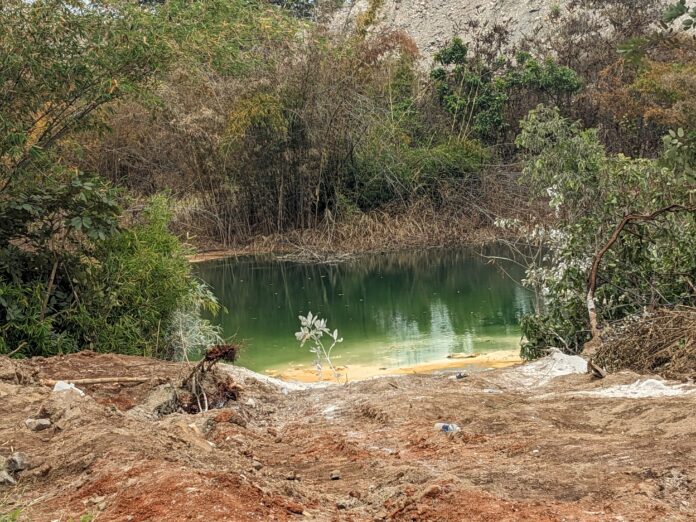The Spill, the Silence, and the Suffering
By Charles Mafa & Kennedy Mbewe
A settlement choked by dust and silence
In Kalusale, a poor settlement overshadowed by the Sino-Metals Leach Zambia copper mine to the east, the air hangs heavy with dust and a faint chemical stench. The maize fields that once brought life and colour to the landscape now lie barren and cracked.
Along the bumpy road leading into Kalusale, a cluster of makeshift homes—some legal, others informal, stand amid the haze. Outside one mud house, five women watch helplessly as trucks thunder past, hauling earth from a nearby pit and enveloping them in choking clouds of dust.
“This is our life now,” said Getrude Nsofwa, 51, her voice hoarse.
“We have become used to it, even though the cough never leaves.” Moments later, her words dissolved into a deep, rasping cough, a sound that seemed to echo the settlement’s silent suffering.
Another woman added: “The coughing, the stomach pains, the burning eyes, these are daily struggles we’ve simply learned to live with.”
According to a source at the mine, Kalusale lies within what was originally designated as a pollution control zone — an area where human settlement is prohibited. He said Sino Metals inherited this “legacy problem” from the era of the state-owned Zambia Consolidated Copper Mines (ZCCM), when residents were allowed to settle in the area.
Since 2008, efforts to relocate them, the source added, have been stalled due to political resistance and community opposition. Today, Kalusale even has a polling station, effectively recognising it as a settlement under Mwambashi Ward in Kalulushi district.
In October, the company informed a visiting delegation from the church mother bodies — the Zambia Conference of Catholic Bishops (ZCCB), the Evangelical Fellowship of Zambia (EFZ), and the Council of Churches in Zambia (CCZ) — that it plans to resettle residents living within the pollution control zone in collaboration with the Office of the Vice-President. However, there is no timeline that has been provided or formal commitment for the resettlement.
A disaster too big to bury
The challenges faced by Kalusale residents are only part of a much larger story — one that reached national attention earlier this year when disaster struck at the mine itself.
Nearly eight months have passed since the dam holding mining waste burst at Sino-Metals, a Chinese state-owned copper in Chambishi just outside Kitwe — unleashing what experts describe as one of Zambia’s worst mining-related disasters in recent years.
The spill released highly acidic waste laden with toxic heavy metals, contaminating a key river that serves as a major source of drinking water.
The company apologised and pledged to compensate affected residents. However, during her visit to the site in September, Vice-President Mutale Nalumango warned that “that may not be all,” emphasising that the safety of Zambians was “non-negotiable.”
But even as top officials pledged accountability, on the ground, silence and fear have begun to take hold.
Access denied, voices silenced
Residents like those interviewed by MakanDaysay their voices have been muted. Access to the affected area remains tightly restricted, with state police, mine security, and Chinese company officials barring journalists and community members from freely moving in and out.
Two journalists and a civic leader, Bernard Chisenga, who attempted to visit Kalusale to interview residents, were intercepted by police and taken to Chambishi Police Station for questioning. They were later released but cautioned not to return without clearance from the mine.
Before their detention, a group of women, eager to speak out, surrounded the journalists’ vehicle, pleading to be interviewed. Their conversation was abruptly cut short when a patrolling police officer intervened.
In an interview with MakanDay, Chisenga — a Kalusale zonal representative in Mwambashi Ward and vice-chairperson of the Ward Development Committee, said he could not understand why he was barred from performing his civic duties in his own community, which even hosts an election polling station.
“I was asked by the police if I had obtained permission from Sino Metals to be in the area,” he said. “They accused me of holding an illegal meeting, and of doing so in the wrong place.”
Sino Metals told MakanDay that “the area in question is a legally designated mining zone, subject to highly restrictive access control in accordance with the law — a standard practice across the global mining industry”.
Company Deputy Chief Executive Officer, Sydney Chileya, said the area is currently under a Government-led investigation, following the commissioning of an independent assessor to carry out an on-site Environmental Impact Assessment (EIA). He added that, due to thefts and illegal mining activities, “necessary restrictions and management measures have been implemented for security reasons.
The dust has settled in Kalusale, but the truth remains buried. In Part II: “The Cover-Up and the Cost,” we follow the paper trail, the corporate denials, and the billion-dollar battle for justice behind Zambia’s most toxic mining scandal.
As part of MakanDay’s commitment to advancing and sustaining investigative journalism in Zambia, this story was developed in collaboration with Kennedy, a journalist with Hope Channel TV. The reporting was supported by The Examination (https://www.theexamination.org/)

Discover more from MAKANDAY
Subscribe to get the latest posts sent to your email.



